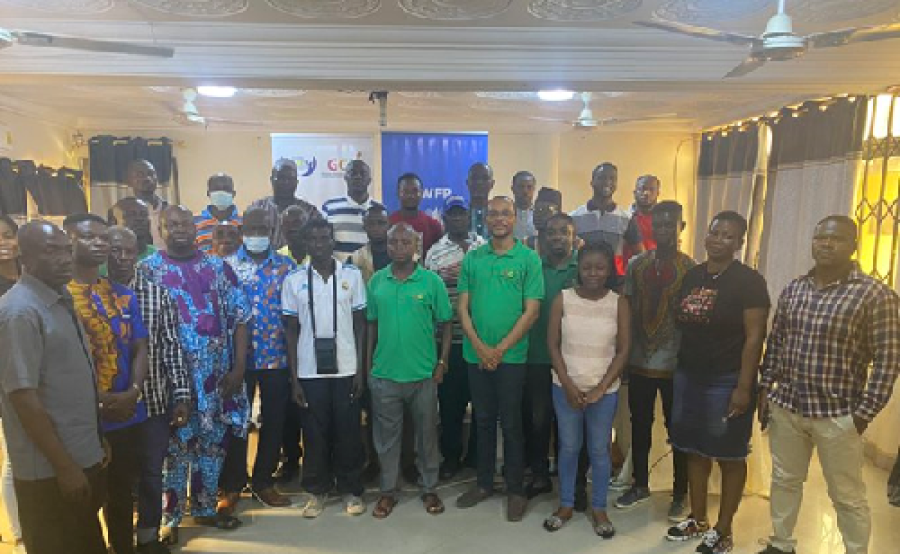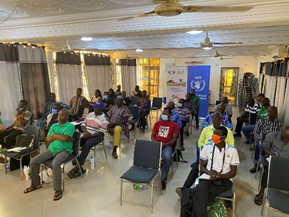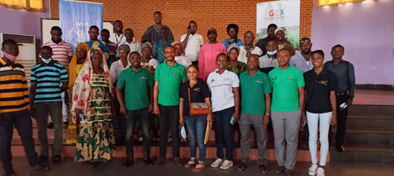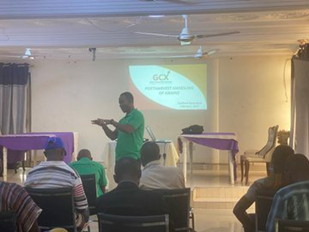GCX IN PARTNERSHIP WITH WFP TRAIN FARMERS & MARKET ACTORS ON POST-HARVEST MANAGEMENT AND GCX OPERATIONS

Some 97 farmers and market actors in the Bono and Ashanti regions and northern Ghana, have been trained on post-harvest management practices, the operations of the Ghana Commodity Exchange (GCX), and available financing options to enable them trade profitably on structured markets such as the Exchange.
The training programme which was held in February and early March 2022, was organized by the Ghana Commodity Exchange (GCX) in partnership with the World Food Programme (WFP), with training undertaken by GCX staff.

This training took place at Techiman for farmers from the Bono and Ashanti regions and in Tamale for farmers from the northern sector of the country. These farmers and market actors were taken through an overview of GCX, how to handle grains after harvesting, grading & warehousing operations, aflatoxin and its effects, the GCX warehouse receipt financing and how to become a member of the Exchange. Time was taken to address all concerns and issues raised by participants on any of the areas discussed and the time spent proved to be successful and engaging.
GCX partnership with WFP commenced in 2019 when GCX took over the management of a 300MT warehouse WFP had constructed for smallholder maize farmers in the Ejurasekyedumase Municipality. With a capacity of 300MT, the warehouse which can store 6,000 pieces of 50kg bags of grain, has played a key role in educating farmers on the benefits of trading on the Exchange and availing themselves of the range of services offered.
As part of the partnership, WFP assists the Exchange in undertaking capacity building for farmers and market actors, with this set of trainings being the first phase of many that are to take place.
 WFP Ghana’s 2019-2023 Country Strategic Plan is supporting national efforts to build efficient, equitable, resilient and inclusive food systems which contribute to ensuring food security, reducing stunting and micronutrient deficiencies by enhancing private sector involvement in nutrition, strengthening linkages between farmers and markets, and promoting sound agricultural quality production and post-harvest management.
WFP Ghana’s 2019-2023 Country Strategic Plan is supporting national efforts to build efficient, equitable, resilient and inclusive food systems which contribute to ensuring food security, reducing stunting and micronutrient deficiencies by enhancing private sector involvement in nutrition, strengthening linkages between farmers and markets, and promoting sound agricultural quality production and post-harvest management.
GCX is using WFP’s support to educate and train market actors including farmers, farmer cooperatives, traders, brokers and financial institutions on post-harvest management, how to gain access to financing through the GCX warehouse receipt financing model, to enable them trade efficiently on a structured market.

Ghana Commodity Exchange is an electronic marketplace, regulated by the Securities and Exchange Commission (SEC) for buyers and sellers of commodities to trade in an efficient and orderly manner. The Exchange currently trades maize, sesame seed, rice, soya beans, sorghum and holds reserve trading auctions for cashew from time to time.
The United Nations World Food Programme - saving lives in emergencies and changing lives for millions through sustainable development. WFP works in more than 80 countries around the world, feeding people caught in conflict and disasters and laying the foundations for a better future.
